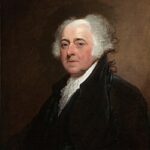The XYZ Affair Origins
The XYZ Affair began when French agents demanded bribes from American diplomats in 1797. French officials requested $250,000 in personal payments before negotiations could begin. President Adams received this shocking news and faced a critical diplomatic crisis. ⚠️ The French Directory treated American representatives with open contempt and hostility.
Adams’ Controversial Response
Adams chose to publicize the French demands rather than pay the bribes. He released diplomatic correspondence that revealed French corruption to Congress. The president began massive naval preparations for an undeclared war with France. 💰 Congress authorized $7 million for naval expansion and military buildup programs.
The Quasi-War Escalates
Adams suspended all trade agreements and authorized attacks on French vessels. The U.S. Navy captured over 80 French ships during the undeclared conflict. Critics argued Adams overreacted to diplomatic insults with excessive military force. 📊 Naval expenses consumed nearly 40% of the federal budget by 1799.
Impact:
Political Party Division
The XYZ Affair split Adams’ own Federalist Party into warring factions. War hawks demanded full military action against the French Republic. Peace advocates criticized Adams for abandoning diplomatic solutions too quickly. 🔥 Alexander Hamilton led Federalists who wanted expanded conflict with France.
Domestic Opposition Grows
Democratic-Republicans accused Adams of manufacturing a crisis for political gain. Thomas Jefferson argued the quasi-war violated constitutional principles of congressional war powers. Anti-war protests erupted in Republican strongholds throughout the southern states. The conflict fueled passage of the controversial Alien and Sedition Acts.
Long-term Consequences
Adams eventually negotiated peace in 1800, angering his Federalist supporters. 📉 The president’s peace efforts contributed to his electoral defeat that year. The XYZ Affair established precedents for presidential war powers without congressional approval. 🌍 It marked the beginning of America’s transition from neutrality to active international involvement.
